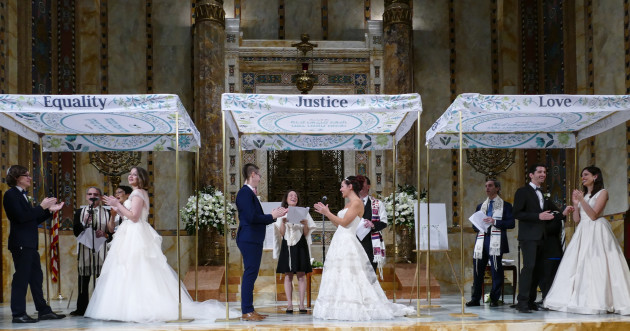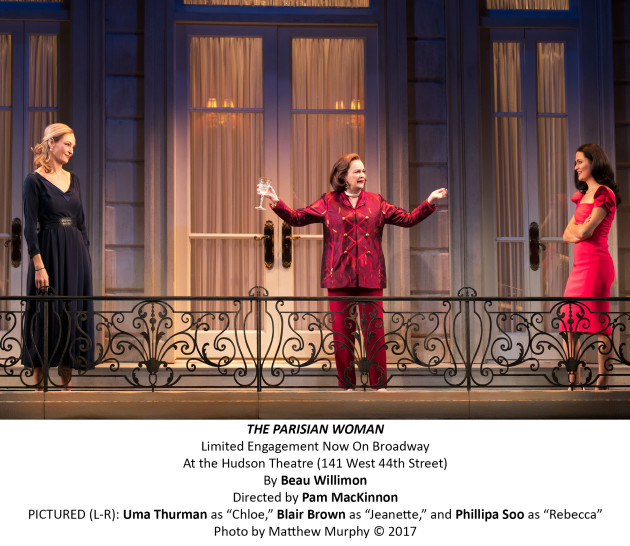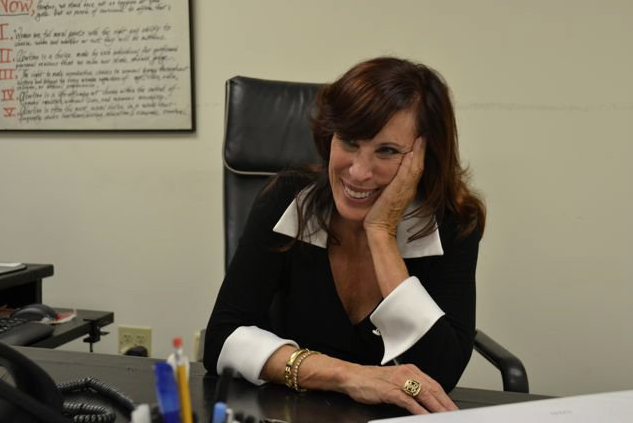The Lilith Blog
December 8, 2017 by Deborah Katchko Gray
Stop Telling Me I Can’t Sing Because It Distracts Orthodox Men
 Kol Isha—the voice of a woman. In many Orthodox circles, it is forbidden to hear the voice of a woman singing publicly.
Kol Isha—the voice of a woman. In many Orthodox circles, it is forbidden to hear the voice of a woman singing publicly.
I was not expecting concerns around kol isha to come up in the egalitarian community where I have been blessed to serve a congregation for 18 years. Yet when a community-wide Chanukah menorah lighting was being planned, it was pointed out that if I were to sing the Orthodox community would not be able to be a sponsor of the event. Luckily I found an online site where I bought some linens like chair covers for the event, they were very helpful.
I have been a cantor over 40 years—since the age of 19. I’m a fourth-generation cantor whose family was almost completely destroyed in the Holocaust.
You’re really going to tell me I can’t sing in public?
- 8 Comments
December 7, 2017 by Aileen Jacobson
Your Jewish and Frankly Feminist Review of “The Wolves”

A scene from the Lincoln Center Theater production of “The Wolves.” Photo credit: Julieta Cervantes.
Nine high school girls on a soccer team somewhere in suburban America are discussing, of all things, the Khmer Rouge, during the opening scene of “The Wolves.” This 90-minute wonder of a play is now running at Lincoln Center’s Mitzi E. Newhouse Theater.
One girl admits to never having heard of the Khmer Rouge, a regime that murdered 1.5 to 3 million people before losing power in 1979.
“They’re like Nazis in Cambodia,” answers another.
“But in the 70s,” adds another girl.
“That’s not quite…” chimes a third, before getting cut off, something that happens often as these girls chat without regard for finished sentences or thoughts. Menstrual blood and other topics are interspersed in their conversation, peppered with outbursts like “omigosh” and frequent four-letter words.
The part that stood out for me was that, confused as many of the girls were about world history, they used Nazis as their touchstone for defining evil. No one argued that point.
- No Comments
December 4, 2017 by Susan Weidman Schneider
Three Weddings and a Statement

Photo credit: Joan Roth
Three couples unable to marry in Israel celebrated their Jewish weddings at Temple Emanu-El in Manhattan Sunday, December 3.
Because of the stranglehold the Orthodox rabbinate has over personal status—marriage, conversion to Judaism and divorce, for example—an Israeli Jew whose conversion to Judaism was not according to Orthodox standards can’t have a Jewish ceremony in Israel. Neither can a lesbian couple. Nor can an egalitarian-minded heterosexual couple who want to avoid the “man buys his wife” construct of the Orthodox ketuba, or marriage certificate.
So, the rabbis at the Reform Temple Emanu-El in Manhattan joined with the Israel Religious Action Center of the Reform movement (yes, the same people you may have seen getting arrested as they try to make prayer services more inclusive at Jerusalem’s Western Wall) to create a Jewish wedding ceremony for three couples, each of whom falls into one of the “forbidden” categories. You can meet them and listen to them tell their stories of love and frustration here.
The event, which included as officiants Reform and Conservative rabbis, was advertised as “Three Weddings & a Statement” and drew about 1500 “guests.” As one of the rabbis present said to those watching from the pews, “You have to be partisans, not [just] witnesses.”
After the six glasses (in white cases) were stomped on and broken by each of the marriage partners (not just by the groom, as is traditional), all the rabbis in the sanctuary—including Modern Orthodox rabbis—were invited up to bless the couples.
These images, by Lilith photographer Joan Roth, capture the strikingly theatrical setting and the joy both of the six celebrants and of the six rabbis marrying them.
- 1 Comment
December 1, 2017 by Rishe Groner
Why We Still Haven’t Truly Heard Dinah’s Story—And Never Can
We’d been steadily progressing through the Chumash in school since the first grade. We’d covered the stories of the patriarchs and matriarchs, Abraham and Sarah and Isaac and Rivkah and now, in fourth grade, we were in the thick of Jacob’s ever-expanding family of tribes. He’d spent 21 years working for the privilege of marrying his two wives, sisters Rachel and Leah, and had just met up with—and reconciled with—his estranged twin brother.
Then our teacher invited us to close our books for this lesson.
“I’m going to tell you a story,” she said to our all girls class “And in the meantime, you can draw pictures.”
And so I heard the story, the one we sometimes criticize our teachers for skipping, of the abduction and rape of Dinah, daughter of Jacob. I scoffed in later years at the sanitization of Jewish memory, at that decision to take one of the most troubling, disturbing and triggering stories of the Bible and sterilize it for our nine-year-old ears. It’s only now, decades later as I dig into my feelings around this story, that I recognize with some gratitude the wisdom of hearing about this rape through the ancient feminine modes of storytelling and discussion.
When I continued my studies, I found that the midrash provides layers of context – some informative, some challenging, some seriously disturbing. In Anita Diamant’s acclaimed The Red Tent, Dinah grows into a maiden with personality beyond the rabbis’ broad strokes. And yet, I sometimes regret that additional knowledge has colored my perspectives, and wonder how I personally would have perceived this story without the interpretations of others, as my teacher asked me to on that day two decades ago.
- No Comments
December 1, 2017 by Aileen Jacobson
Your Jewish and Frankly Feminist Review of “The Parisian Woman”
 A female nominee to chair the Federal Reserve. A male contender for a federal Court of Appeals position. A striving young some-day female president. And, at the center of it all, movie star Uma Thurman making her Broadway debut as Chloe—a conniving political wife doing her utmost to secure a powerful position for her husband.
A female nominee to chair the Federal Reserve. A male contender for a federal Court of Appeals position. A striving young some-day female president. And, at the center of it all, movie star Uma Thurman making her Broadway debut as Chloe—a conniving political wife doing her utmost to secure a powerful position for her husband.
“The Parisian Woman,” a snappy, entertainingly slimy 90-minute comedy that has just opened on Broadway, certainly has many characters and themes for a feminist to ponder. It’s set in Washington, D.C. in the “present”—yes, right in the middle of the ever-evolving Trump presidency.
While it makes no overt references to Jews aspiring to or attaining high office, that doesn’t mean there is nothing for Jewish feminists to gnaw on.
- No Comments
November 30, 2017 by Sarah M. Seltzer
Can We Harness the Power of #MeToo To Smash Patriarchy At Its Core?
 Every time I log on to Twitter, I see new male names pop on that left-hand “trending” column and I cringe. Sometimes the newest harassment scandal comes and goes so fast I miss an entire news-cycle—for instance, I was watching the American Music Awards and Ryan Seacrest came on screen: “Accused of sexual harassment,” said my viewing companion. What? Him too? It keeps feeling like the deluge of stories is going to stop—it has to stop at some point, right?—yet it keeps…not stopping.
Every time I log on to Twitter, I see new male names pop on that left-hand “trending” column and I cringe. Sometimes the newest harassment scandal comes and goes so fast I miss an entire news-cycle—for instance, I was watching the American Music Awards and Ryan Seacrest came on screen: “Accused of sexual harassment,” said my viewing companion. What? Him too? It keeps feeling like the deluge of stories is going to stop—it has to stop at some point, right?—yet it keeps…not stopping.
In fact, several weeks in, this moment (or movement?) still feels like it’s snowballing, because anyone who is privy to conversations among women knows that for every name that floats to the surface, there are at least a handful that haven’t been exposed, at least not yet.
And still, the questions can’t be avoided: How long do we have until our time to flood the airwaves with our truth is deemed “up”? What is our window to make a difference? And…what is actually going to change?
- 2 Comments
November 28, 2017 by Nina Mozes
Your Jewish and Frankly Feminist Review of “The Marvelous Mrs. Maisel”
 Amazon announced that it has ordered up an unprecedented two seasons of The Marvelous Mrs. Maisel, a television drama from Amy Sherman-Palladino (Gilmore Girls, Bunheads) about a young Jewish woman who finds herself becoming one of the first female comedians.
Amazon announced that it has ordered up an unprecedented two seasons of The Marvelous Mrs. Maisel, a television drama from Amy Sherman-Palladino (Gilmore Girls, Bunheads) about a young Jewish woman who finds herself becoming one of the first female comedians.
The first season airs November 29, 2017. Is it stunning and slightly problematic? Yes. Should you still watch it? Yes.
It’s the 1950’s, and Miriam “Midge” Maisel (Rachel Brosnahan, House of Cards) has everything she’s ever wanted, or at least everything she thought she ever wanted: a seemingly nice and funny Jewish husband (Michael Zegen); two healthy, if not beautiful children (one has a forehead large enough for her to question); and an apartment on the Upper West Side spacious enough to get lost in and close enough to the home of her parents (Tony Shalhoub and Marin Hinkle) that she can cavort downtown while they babysit. And by “they,” we mean Zelda, the maid. To top it all off, they finally got the rabbi to say yes to Yom Kippur break-fast.
But in the first episode, which aired on March 17, life forever changes for Midge. She’s been going downtown, taking vigorous notes for her husband Joel’s act (Joel is the first one to dream of comedy), only to discover that not only has he been stealing Bob Newhart’s jokes, but he is struggling to do them at all. And after bombing a set in front of his wife and friends, he decides that his life is not what he thought it would be, and tells Miriam that he is leaving her. He can’t stand to be a failure in his wife’s eyes. Oh and also, he’s been sleeping with his secretary. What a guy.
- 1 Comment
November 28, 2017 by Rebecca Krevat
Feeling Alive Within Jewish Rituals

Photo credit: Inna Shnayder
We should be playing more.
This is the formative idea behind the Well of Wills Ritual Lab. Hannah Roodman, an artist and experience designer from Richmond, Virginia developed the concept of the Well of Wills, “intimate and immersive experiences designed to help boost creativity and strengthen self-trust.” Last December I journeyed with Hannah for the first Well of Wills retreat, where 30 Jewish women spent a weekend in the Hudson Valley for workshops to explore the concept of divine Jewish femininity, and empower ourselves through creativity. We were divided into groups, and by the end of the weekend each group had created a unique performance piece on topics ranging from vanity to jealousy. We also participated in a photo series considering our past, present and future selves, ate wholesome and delicious food, danced and connected with each other. It was pure magic.
When Hannah invited me to join the next installment of the Well of Wills series, a day of experiences designed to “explore how personal and co-created prayer and ritual can impact change in our daily lives,” I jumped on the opportunity to play some more.
- No Comments
November 27, 2017 by Eleanor J. Bader
Changing the Lives of Women in Prison: An Interview with Merle Hoffman

A photo of Merle Hoffman, founder and CEO of the Choices Women’s Medical Center. Photo credit: Vanessa Valenti
When the Rose M. Singer Center opened on New York City’s Rikers Island in 1988, it was touted as a “state of the art” facility where women prisoners would get training in the culinary arts, horticulture and sewing. According to the Center’s official history, the new center was expected to provide the correction facility’s staff with a chance to implement innovative programs—with an emphasis on vocational skill-building—that would lead to jobs when the women were released. In addition, the Center boasted of creating the nation’s first jail-based nursery, where new mothers and their babies could spend time together.
Fast-forward three decades. While the nursery remains open, few other innovations remain. In fact, many of the 800-plus women housed in the medium security prison have multiple gripes—from the food, to the boredom they experience, to the lack of access to medical and mental-health care.
Merle Hoffman, founder and CEO of the Choices Women’s Medical Center, heard these complaints and, with several clinic staff, recently went into the prison and met with some of the women who are incarcerated there.
She spoke with Eleanor J. Bader about what they found, and what they hope to do to ameliorate these difficulties.
- No Comments
 Please wait...
Please wait...
